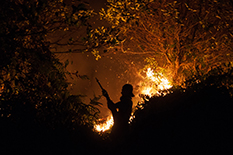As fires continue to burn across millions of hectares in Central Kalimantan, Indonesia, the Center for International Forestry Research (CIFOR) of the CGIAR Consortium has produced a series of stories and videos based on research from its on-site scientists.
The UN Environment Programme (UNEP) has also expressed deep concern, underscoring the need to address the issue through a long-term integrated approach.
 November 2015: As fires continue to burn across millions of hectares in Central Kalimantan, Indonesia, the Center for International Forestry Research (CIFOR) of the CGIAR Consortium has produced a series of stories and videos based on research from its on-site scientists. The UN Environment Programme (UNEP) has also expressed deep concern, underscoring the need to address the issue through a long-term integrated approach.
November 2015: As fires continue to burn across millions of hectares in Central Kalimantan, Indonesia, the Center for International Forestry Research (CIFOR) of the CGIAR Consortium has produced a series of stories and videos based on research from its on-site scientists. The UN Environment Programme (UNEP) has also expressed deep concern, underscoring the need to address the issue through a long-term integrated approach.
Raging for more than two months, most of the fires in Central Kalimantan are blazing in former peatland forests that have been drained, cleared and burned to allow for the growth of oil palm and agriculture. The dried-out peat ignites easily and burns underground; the fire then creeps along under the surface. CIFOR has highlighted the climate change-related consequences, as well as short-term health impacts: millions of tons of carbon dioxide stored deep inside the peat could be released if it continues to be disturbed, either by development for farming or by fire. In addition, as a first survey on the smoke content indicated high concentrations of carbon dioxide, methane, as well as toxic carbon monoxide, the health impacts are seen daily in Palangkaraya, the provincial capital.
CIFOR has developed a fact file, photo album, and a series of articles and videos, which are available for use with correct attribution. According to CIFOR, a series of suggested sustainable solutions for Indonesian peatlands include: drastically reduced conversion of forests into agriculture; reduced use of fire in agriculture; overall reduction of cultivation on peatlands; improved opportunities for rural livelihoods and income; improved markets and value chains for sustainable products; and restoration of degraded peatlands.
In related news, the UN Environment Programme (UNEP) has expressed deep concern about the effects of the fires on the health of local populations, ecosystems and wildlife, as well as the global climate, noting that the fires are an annual, systemic issue that need to be addressed with an integrated approach over the long term, including through a national moratorium on using fires for clearing any type of forest land, the promotion of sustainable business practices, and the accountability of large-scale land owners and companies for the damage caused. [CIFOR Media Package] [UNEP News Release]